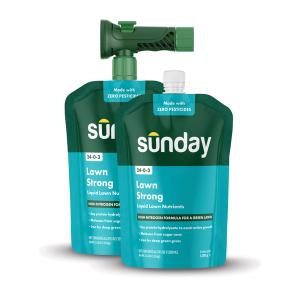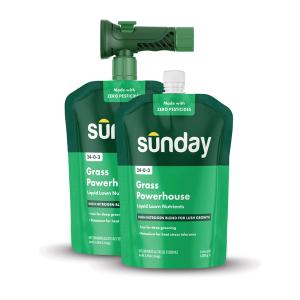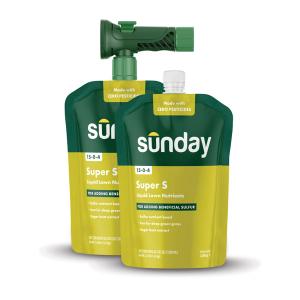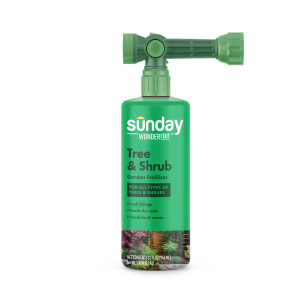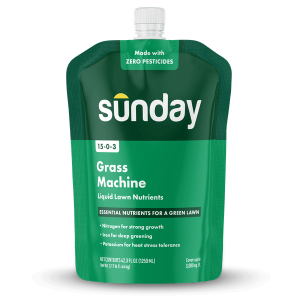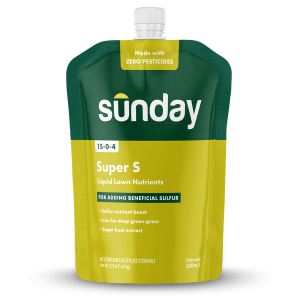The three essentials
Feed the grass
Your lawn needs nutrients to grow.
The main ones are nitrogen, phosphorus, and potassium. Nitrogen fuels leafy growth. Phosphorus supports roots. Potassium helps your lawn handle stress.
But more isn't better. Over-fertilizing wastes product, can burn your grass, and sends excess nutrients into local waterways.
Sunday’s approach is simple. We don’t believe in tossing down fertilizer and hoping it works. We look at your soil, your local climate, and your grass type to figure out what nutrients your lawn actually needs and when it needs them. If you follow your custom schedule, your lawn uses what you apply, so little to none goes to waste.
When to fertilize
Timing depends on where you live and what your lawn needs, but here's a general rhythm:
Spring: Iron-rich formulas help kickstart greening after winter dormancy.
Summer: Slow-release nitrogen keeps growth steady (without pushing your lawn too hard in the heat).
Fall: Fall formulas repair summer stress and prep roots for winter.
Sunday Tip:
Sunday has the largest residential soil database in the country. That's how we build custom nutrient plans tailored to your soil. To get to know YOUR soil, we include a free soil test with every plan.
Water deep
The rule of thumb is about an inch of water per week.
In many regions, rainfall handles most of that. When it doesn't, supplement with deep, infrequent watering.
Deep watering encourages roots to grow down, not out. Shallow, frequent watering does the opposite. It trains roots to stay near the surface, which makes your lawn more vulnerable to heat and drought.
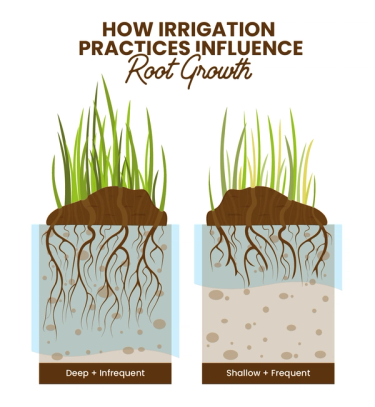
When you water less often but more deeply, grass roots learn to grow down into the soil to reach moisture.
How to water well
Water in the early morning. This reduces evaporation and gives grass time to dry before evening, which helps prevent disease.
- Aim for 1–3 watering sessions per week, not daily.
- Each session should deliver about 0.3–0.5 inches of water. For most sprinklers, that's around 30 minutes.
Sunday Tip:
Put a small container (like a tuna can) on your lawn while you water. When it fills to half an inch, you've hit the mark. Bonus: you'll probably realize you've been overwatering.
Mow high
Think of mowing as a trim, not a chop. Set your mower to its highest setting. Taller grass shades the soil, retains moisture, and crowds out weeds.
A few principles:
- Never remove more than one-third of the blade length at a time. This is called the one-third rule. Sounds made up. It's not. Cutting too much stresses the grass.
- Mulch your clippings instead of bagging. They break down fast and return nutrients to the soil. (Free fertilizer. Your lawn made it. Might as well use it.)
- Mow more often during peak growth (usually spring and early summer), less often as things slow down.
Sunday Tip:
Sharpen your mower blade at least once a season. A dull blade shreds grass instead of cutting it cleanly, which invites disease.
Ready for more? Weeding and seeding
Once you've nailed the basics, you can start thinking about weed control and seeding. These aren't required for every lawn, but they help you take things further.
Weeding
The best defense against weeds is a thick, healthy lawn. When grass is strong, weeds struggle to take hold.
But if weeds show up anyway, here's how to handle them:
- Pre-emergent stop weeds before they sprout. Apply in early spring when soil temps are around 50–55°F, but before they hit 70+°F. Our pick: Weed & Green Hose-end Pre-emergent for Lawns
- Post-emergent target weeds that are already growing. Spot-treat when weeds are small and easy to manage. Our pick: Dandelion Doom Lawn-safe Weed Killer
Knowing what you're dealing with matters. Correct lawn weed ID helps you choose the right product and avoid unnecessary applications.
Seeding
Seeding fills in thin or bare spots and introduces stronger grass varieties to your lawn.
When to seed
- For cool-season grasses (fescue, bluegrass, rye): early fall is ideal. Spring works too, but fall gives seedlings more time to establish before summer heat.
- For warm-season grasses (Bermuda, Zoysia, St. Augustine): late spring or early summer, when the soil is fully warmed up, is best.
How to seed
- Rake lightly before spreading seed. (Good seed-to-soil contact is key for successful establishment.)
- Keep the soil consistently moist until seeds germinate. This usually means watering daily, and takes 7–21 days depending on grass type.
- Avoid heavy foot traffic on newly seeded areas until grass establishes.
Start simple to build good lawn habits
You don't need to do everything at once. Feed, water, mow. Get those right, and your lawn will handle the rest better than you'd expect.
When you're ready to go deeper into your lawn care practices, seeding and weed control are there. But the basics are where healthy lawns begin.
Not sure where to start?
Sunday uses satellite data to map your lawn and build a plan around your soil, climate, and local conditions. You get the right products, timed for when your lawn needs them.








